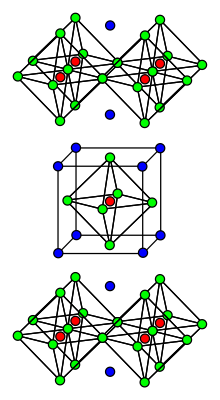
| |
| Identifiers | |
|---|---|
| Properties | |
| Ba0.15CuLa1.85O4 | |
| Molar mass | 405.116 g·mol−1 |
| Appearance | black solid |
Except where otherwise noted, data are given for materials in their
standard state (at 25 °C [77 °F], 100 kPa).
| |
Lanthanum barium copper oxide, or LBCO, is an inorganic compound with the formula CuBa0.15La1.85O4. It is a black solid produced by heating an intimate mixture of barium oxide, copper(II) oxide, and lanthanum oxide in the presence of oxygen. The material was discovered in 1986 and was the first high temperature superconductor. [1] Johannes Georg Bednorz and K. Alex Müller shared the 1987 Nobel Prize in physics for the discovery that this material exhibits superconductivity at the then unusually high temperature. This finding led to intense and fruitful efforts to generate other cuprate superconductors. [2]
Lanthanum barium copper oxide is related to the far simpler compound lanthanum cuprate, which has a similar structure. In lanthanum barium copper oxide, some of the La(III) centers are replaced by Ba(II), which has a similar ionic radius. This Ba-for-La replacement causes removal of some electrons from the d-band associated with the sheets of copper oxide. [3]
References
- ^ J. G. Bednorz and K. A. Müller (1986). "Possible high Tc Superconductivity in the Ba−La−Cu−O System". Z. Phys. B. 64 (1): 189–193. Bibcode: 1986ZPhyB..64..189B. doi: 10.1007/BF01303701. S2CID 118314311.
- ^ Keimer, B.; Kivelson, S. A.; Norman, M. R.; Uchida, S.; Zaanen, J. (2015). "From quantum matter to high-temperature superconductivity in copper oxides". Nature. 518 (7538): 179–186. Bibcode: 2015Natur.518..179K. doi: 10.1038/nature14165. hdl: 1887/3197267. PMID 25673411. S2CID 205242367.
- ^ Raveau, Bernard (2013). "Impact of Crystal Chemistry upon the Physics of Strongly Correlated Electrons in Oxides". Angewandte Chemie International Edition. 52 (1): 167–175. doi: 10.1002/anie.201204884. PMID 23203459.